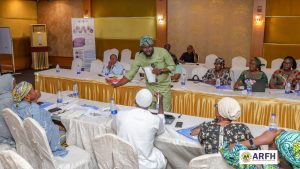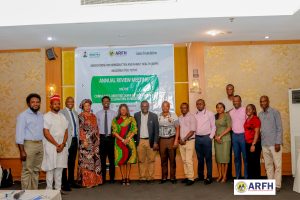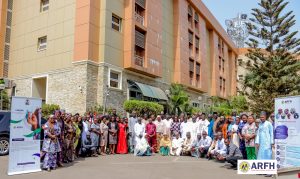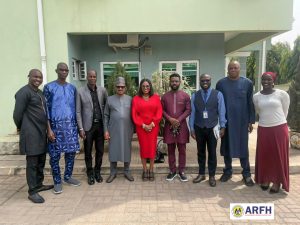
Isiaku Abubakar is now able to eat and play again like many other children in Kebbi and Adamawa states, thanks to the EU-funded UNICEF-ARFH collaboration with Kebbi state Ministry of Health and State Primary Healthcare Development Agency on the Integrated Community Case Management (iCCM) of Childhood Illnesses.
But just a few days ago, Isiaku could neither eat nor play and had no interest in his surroundings. Following community mobilization in Mahuta community of Fakai LGA, Kebbi state by the UNICEF-ARFH iCCM Project, Isiaku was brought to ‘trainee’ Community Oriented Resource Persons (CORPs) by his grandmother, Fati Yusuf who is his primary caregiver. The CORPs assessed him and found him to be unable to eat or drink, unusually sleepy or unconscious, presenting with a fever for more than 7 days, yellowness of the eyes as well as rashes in the mouth. These are specific danger signs which CORPs are trained to look out for and Isiaku was immediately referred to the health facility for more specialized care as is the procedure for iCCM.
Isiaku, like many children in Nigeria’s underserved communities, suffer from many illnesses, particularly malaria, diarrhea and pneumonia, which account for high rates of illness and death amongst children, usually complicated by malnutrition. Due to the imbalance in the distribution of health care services especially in underserved and hard-to-reach communities, community members have no choice, but rely on readily available services, such as home treatment with herbal remedies and informal medicine vendors. They only visit the health facilities when the case becomes complicated. However, the iCCM strategy is bridging this gap by bringing health care services closer to communities through trained community volunteers who provide basic health services such as treatment of malaria, diarrhea and pneumonia for children under the age of 5. This is in addition to pre-referral treatment and timely referral services for children with malnutrition and specific danger signs of these illnesses to health facilities.

When the UNICEF-ARFH iCCM team followed up on Isiaku 3 days after he was admitted at the health facility, he had been discharged and was able to eat, drink and respond to his surroundings. The team also observed that his physical signs of illness were clearing. Dr. Adamu Marafa, who treated Isiaku, expressed his appreciation for the newly trained CORPs in the community, and for the support the iCCM project provides in improving primary health care services through the linkage it creates between the health facilities and the communities. Isiaku’s grandmother, Fati, expressed her gratitude to the iCCM project. In her words “may Allah bless everyone involved and the organization that initiated and funded this program”.
iCCM exemplifies how partnerships between private and public agencies can improve lives and build a healthier and sustainable future.




